Melles Surname Ancestry ResultsOur indexes 1800-1900 include entries for the spelling 'melles'. In the period you have requested, we have the following 10 records (displaying 1 to 10): Buy all | | | Get all 10 records to view, to save and print for £58.00 |
These sample scans are from the original record. You will get scans of the full pages or articles where the surname you searched for has been found. Your web browser may prevent the sample windows from opening; in this case please change your browser settings to allow pop-up windows from this site.  Apprentices registered in Scotland
(1800) Apprentices registered in Scotland
(1800)
Apprenticeship indentures and clerks' articles were subject to a 6d or 12d per pound stamp duty: the registers of the payments usually give the master's trade, address, and occupation, and the apprentice's name, as well as details of the date and length of the apprenticeship. There are central registers for collections of the stamp duty in London, as well as returns from collectors in the provinces. These collectors generally received duty just from their own county, but sometimes from further afield. The indentures themselves can date from a year or two earlier than this return. (The sample entry shown on this scan is taken from a Bristol return. Each entry has two scans, the other being the facing page with the details of the indenture, length of service, and payment of duty.) IR 1/69MELLES. Cost: £8.00.  | Sample scan, click to enlarge

| Traders and professionals in London
(1805)
Holden's Triennial Directory for 1805 to 1807 includes this 'London Alphabet of Businesses, Professions, &c.': coverage is good; about 30,000 individuals are recorded.MELLES. Cost: £4.00.  | Sample scan, click to enlarge
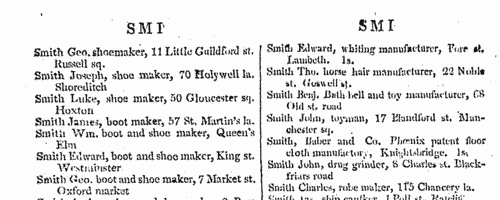
| Insolvents
(1827)
Insolvency notices for England and Wales: insolvency often caused people to restart their lives elsewhere, so these are an important source for lost linksMELLES. Cost: £6.00.  | Sample scan, click to enlarge

| Hertfordshire Sessions
(1699-1850)
Incidents from the Hertfordshire Sessions Rolls. These cover a wide range of criminal and civil business for the county, with presentments, petitions, and recognizances to appear as witnesses: many of the records concern the county authorities dealing with regulation of alehouses, religious conventicles, absence from church, highways, poaching, profanation of the Sabbath, exercising trades without due apprenticeship &c. Unlike the Sessions Books, the decisions of the justices are not recorded on the rolls, which serve more as a record of evidence and allegations. This is a calendar of abstracts of extracts: it is by no means a completely comprehensive record of the surviving Hertfordshire sessions rolls of the period, but coverage is good. MELLES. Cost: £4.00.  | Sample scan, click to enlarge
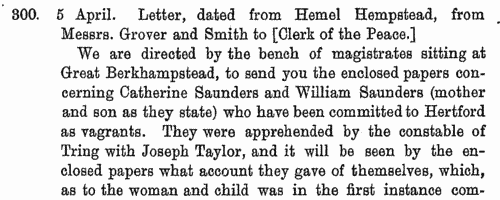
| Gentry in London
(1856)
The Post Office London Directory for 1856 includes this 'Court Directory', listing alphabetically by surname and christian name the upper class residents of the capital with their postal addresses. 'In order to afford space for the addresses, the abbreviation "esq." for esquire has no longer been appended to each name in the Court Directory. It should be understood that such should be added to the name of every gentleman in the following pages to which no inconsistent addition is affixed.' Decorations, honours &c. are generally given. Some gentlemen appear who are also listed (as professional men, &c.) in the commercial section. Those with second residences in the provinces usually have the country address given as well.MELLES. Cost: £4.00.  | Sample scan, click to enlarge

|  Persons of standing recommending London police recruits
(1843-1857) Persons of standing recommending London police recruits
(1843-1857)
The Metropolitan Police Register of Joiners (MEPO 4/334) lists policemen joining the force 1 January 1843 to 1 April 1857 (warrant numbers 19893 to 35804). The register is alphabetical, in so far as the recruits are listed chronologically grouped under first letter of surname. It gives Date of Appointment, Name, Number of Warrant, Cause of Removal from Force (resigned, dismissed, promoted or died), and Date of Removal. Although the register was closed for new entrants at the end of 1842, the details of removals were always recorded, some being twenty or more years later. Those recruits not formerly in the police, the army, or some government department, were required to provide (normally) at least two letters of recommendation from persons of standing, and details of these are entered on the facing pages. Where a recruit was only recently arrived in the metropolis, the names and addresses of the recommenders can be invaluable for tracing where he came from. Those recruits not formerly in the police, the army, or some government department, were required to provide (normally) at least two letters of recommendation from persons of standing, and details of these are entered on the facing pages: the names in these are indexed here (the police recruits are indexed separately and not included here). Recruits transferred from other forces or rejoining the force did not normally need recommendations - in the latter case, former warrant numbers are given - but some recommendations are from police inspectors, even other constables. Recruits coming from the army sometimes have general military certificates of good conduct, but most often have a letter from their former commanding officer; recruits recommended by government departments (most often the Home Office) similarly have letters from the head of department. But the great majority of the names and addresses in these pages are of respectable citizens having some sort of personal acquaintance with the recruit. Where more than two recommendations were provided, the clerk would only record one or two, with the words 'and others'. Tradesmen are sometimes identified as such by their occupations; there are some gentry. Although the bulk of these names are from London and the home counties, a scattering are from further afield throughout Britain and Ireland. MELLES. Cost: £8.00.  | Sample scan, click to enlarge

| Scottish Abstainers
(1865)
Lists of members of the Scottish Temperance League, branch by branch; donations and subscriptions; officers of abstinence societies; and ministers connected with the league. Mostly Scotland, but including England, Ireland and the colonies.
MELLES. Cost: £6.00.  | Sample scan, click to enlarge
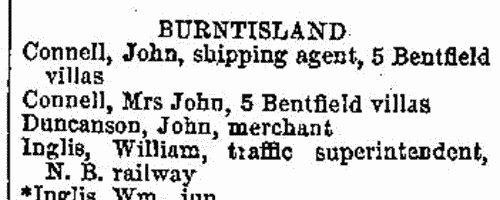
| Eton College boys and masters
(1900)
Printed lists of boys attending Eton College were issued each School-Time or term. This is the list for Midsummer School-Time, 1900. The governors and masters of the schools are given first: then the names of a scholar elected for King's in December 1899, and the names and ages of 16 scholars elected for Eton in July 1899, 15 of whom had been admitted. Winners of the Newcastle Scholarship, two each year, back to 1829, and of the various college scholarships and prizes for 1899 and 1900, precede the Distinctions in Trials (examinations) for March 1900. The First Hundred and Certificate examination list for Election 1899 list the boys in order of merit and with the marks awarded in Classics, Mathematics, Scripture Knowledge and History. The Certificate list is divided into First, Second and Third Classes, Passed, and Failed. The names of examiners and absentees are also given. Then follow the main lists of all the pupils, arranged by class. For every boy his position in class, surname, house tutor's name and classical tutor's name, are given; and evey boy's entry is annotated with details of his prizes during his whole period at the school. In the fifth forms the list for each class is divided into four parts, divided by a dotted line, then a wavy line, and then a full line. The top fourth had all obtained distinction in the last trials; those above the wavy line had been classed in the last trials; next were the unclassed; and below the full line were those boys who had failed in the trials.
MELLES. Cost: £6.00.  | Sample scan, click to enlarge
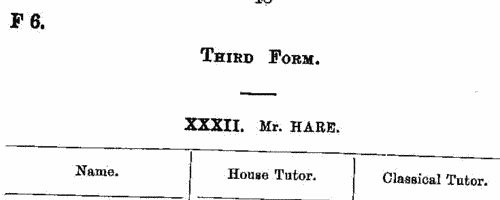
| Eton College boys and masters
(1900)
Printed lists of boys attending Eton College were issued each School-Time or term. This is the list for Michaelmas School-Time, 1900. The governors and masters of the schools are given first: then the names of a scholar elected for King's in December 1899, and the names and ages of 20 scholars elected for Eton in July 1900, 12 of whom had been admitted. Winners of the Newcastle Scholarship, two each year, back to 1829, and of the various college scholarships and prizes for 1899, precede the Distinctions in Trials (examinations) for July 1900. The First Hundred and Certificate examination list for Election 1900 list the boys in order of merit and with the marks awarded in Classics, Mathematics, Scripture Knowledge and History. The Certificate list is divided into First, Second and Third Classes, Passed, and Failed. The names of examiners and absentees are also given. Then follow the main lists of all the pupils, arranged by class. For every boy his position in class, surname, house tutor's name and classical tutor's name, are given; and evey boy's entry is annotated with details of his prizes during his whole period at the school. In the fifth forms the list for each class is divided into four parts, divided by a dotted line, then a wavy line, and then a full line. The top fourth had all obtained distinction in the last trials; those above the wavy line had been classed in the last trials; next were the unclassed; and below the full line were those boys who had failed in the trials.
MELLES. Cost: £6.00.  | Sample scan, click to enlarge
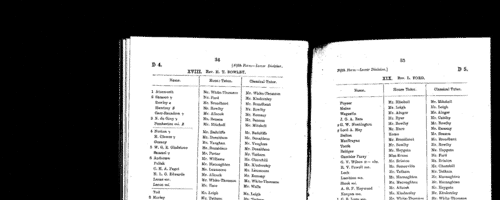
| Eton College boys and masters
(1900)
Printed lists of boys attending Eton College were issued each School-Time or term. This is the list for Lent School-Time, 1900. The governors and masters of the schools are given first: then the names of a scholar elected for King's in December 1899, and the names and ages of 16 scholars elected for Eton in July 1899, 12 of whom had been admitted. Winners of the Newcastle Scholarship, two each year, back to 1829 (here indexed from 1859 onwards), and of the various college scholarships and prizes for 1899, precede the Distinctions in Trials (examinations) for December 1899. The First Hundred and Certificate examination list for Election 1899 list the boys in order of merit and with the marks awarded in Classics, Mathematics, Scripture Knowledge and History. The Certificate list is divided into First, Second and Third Classes, Passed, and Failed. The names of examiners and absentees are also given. Then follow the main lists of all the pupils, arranged by class. For every boy his position in class, surname, house tutor's name and classical tutor's name, are given; and evey boy's entry is annotated with details of his prizes during his whole period at the school. In the fifth forms the list for each class is divided into four parts, divided by a dotted line, then a wavy line, and then a full line. The top fourth had all obtained distinction in the last trials; those above the wavy line had been classed in the last trials; next were the unclassed; and below the full line were those boys who had failed in the trials.
MELLES. Cost: £6.00.  | Sample scan, click to enlarge
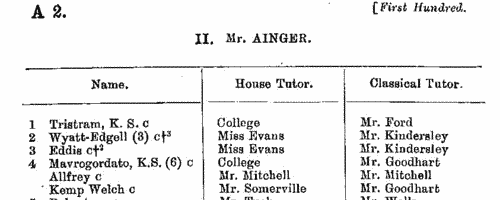
|
Research your ancestry, family history, genealogy and one-name study by direct access to original records and archives indexed by surname.
|













